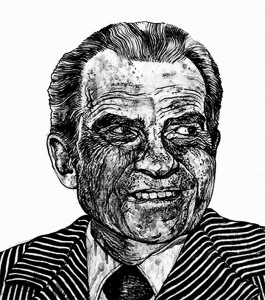Thirty-six years ago, as former President Richard M. Nixon dodged grand jury questions about his illegal wiretapping of political enemies, he briefly referenced a dark secret about his 1968 campaign's sabotaging of Vietnam War peace talks, actions which President Lyndon Johnson at the time privately labeled "treason."
Without providing that historical context, Nixon complained that he and his 1968 campaign had been victims of surveillance and wiretapping, too, as he tried to persuade Watergate prosecutors and the grand jury that bugging opponents was just part of hardball politics.
"In 1968, for example, we learned that not only was ... Vice President [-ial nominee Spiro] Agnew's plane under surveillance, and he himself was under surveillance by the FBI, but that the FBI was at one point directed to bug my plane," Nixon said, according to secret grand jury transcripts released by the National Archives on Thursday.
During that testimony on June 23, 1975, the prosecutors failed to follow up on his reference to the 1968 bugging, such as why it would be ordered. And after the transcripts were released this week, the major U.S. news media also missed the comment's significance.
The evidence of Nixon's sabotage of the 1968 Vietnam peace talks is now overwhelming -- including diplomatic cable traffic and contemporaneous audiotapes of Johnson discussing the Republican promises to South Vietnamese President Nguyen van Thieu of a better deal if he boycotted negotiations in Paris.
But the American press corps has never given this shocking scandal much attention. So, when the newly released transcripts revealed Nixon veering off topic into his complaint that the FBI had been involved in bugging his 1968 campaign, the strange diversion was noted by the New York Times near the end of its article but not explained.
Yet, in citing the 1968 case during that 1975 testimony, Nixon was reviving a complaint he had raised in a White House meeting on July 1, 1972, just two weeks after his "plumbers" had been arrested bugging the Democratic National Committee at the Watergate building in Washington.
According to Nixon's White House tapes, his aide Charles Colson touched off Nixon's musings by noting that a newspaper column claimed that the Democrats had bugged the telephones of Anna Chennault, a right-wing Chinese-American activist who in 1968 had served as Nixon's intermediary to Thieu.
"Oh," Nixon responded, "in '68, they bugged our phones too."
Colson: "And that this was ordered by Johnson."
Nixon: "That's right"
Colson: "And done through the FBI. My God, if we ever did anything like that you'd have the ..."
Nixon: "Yes. For example, why didn't we bug [the Democrats' 1972 presidential nominee George] McGovern, because after all he's affecting the peace negotiations?"
Colson: "Sure."
Nixon: "That would be exactly the same thing."
A Dangerous Game
(Note: You can view every article as one long page if you sign up as an Advocate Member, or higher).






